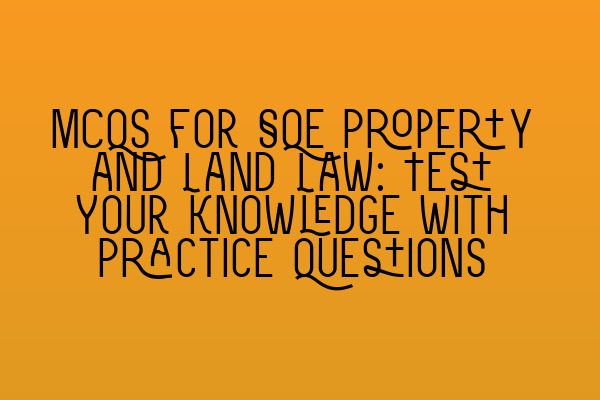MCQs for SQE Property and Land Law: Test Your Knowledge with Practice Questions
Welcome to SQE Property Law & Land Law! As a leading solicitor firm specializing in property and land law, we understand the importance of staying up to date with the latest legal knowledge and preparing for exams. To help you test your knowledge and enhance your understanding of property and land law, we have compiled a set of multiple-choice questions (MCQs) for you to practice. Test your skills and see how well you know the ins and outs of property and land law.
Before we dive into the practice questions, let’s understand why practicing MCQs is essential for exam success. MCQs provide an effective way to assess your knowledge and identify any gaps in your understanding. By answering these questions, you can identify which areas you need to focus on and further improve.
The SQE Property and Land Law exams are designed to evaluate your ability to apply legal principles to practical scenarios. Therefore, practicing MCQs can help you develop your analytical and critical thinking skills required for these exams. It also enables you to become familiar with the style and format of the questions, allowing you to answer them more efficiently during the actual exam.
Now, let’s get started with the practice questions:
1. Which of the following is a requirement for a valid contract of sale of land?
a. Consideration
b. Capacity
c. Intention to create legal relations
d. All of the above
2. What is the main purpose of a land registry?
a. To maintain a record of all land transactions
b. To regulate property prices
c. To provide legal advice on property disputes
d. None of the above
3. Which of the following restrictions may be imposed on a property’s title?
a. Restrictive covenants
b. Easements
c. Mortgages
d. All of the above
4. What is adverse possession?
a. A legal process for transferring property to a new owner
b. A method of acquiring land through continuous occupation
c. A contractual agreement between two parties
d. None of the above
5. How is leasehold ownership different from freehold ownership?
a. Leasehold ownership is temporary, while freehold ownership is permanent
b. Leasehold ownership does not include the land, while freehold ownership includes both land and property
c. Leasehold ownership cannot be transferred, while freehold ownership can be freely sold or transferred
d. All of the above
6. Which of the following is not an essential element of a valid lease?
a. Rent
b. Duration of the lease
c. Identification of the parties
d. Termination clause
7. What is the purpose of requiring planning permission for property development?
a. To ensure compliance with building regulations
b. To protect the environment
c. To maintain the aesthetic value of the area
d. All of the above
8. What is the significance of easements in property law?
a. Easements allow a person to use another person’s land for a specific purpose
b. Easements grant exclusive ownership of a portion of land
c. Easements restrict the use of land by the owner
d. None of the above
9. Which of the following is not a statutory right enjoyed by residential tenants?
a. Right to repair
b. Right to quiet enjoyment
c. Right to evict the landlord
d. Right to proper facilities
10. What is the purpose of due diligence in property transactions?
a. To uncover any legal issues or risks associated with the property
b. To expedite the transaction process
c. To negotiate a lower purchase price
d. None of the above
Now that you have completed the practice questions, take a moment to review your answers and compare them against the correct answers provided below:
1. d. All of the above
2. a. To maintain a record of all land transactions
3. d. All of the above
4. b. A method of acquiring land through continuous occupation
5. a. Leasehold ownership is temporary, while freehold ownership is permanent
6. d. Termination clause
7. d. All of the above
8. a. Easements allow a person to use another person’s land for a specific purpose
9. c. Right to evict the landlord
10. a. To uncover any legal issues or risks associated with the property
We hope these practice questions have helped you assess your knowledge of property and land law. If you found this exercise useful and would like to further enhance your understanding, consider enrolling in our SQE 1 Preparation Courses or SQE 2 Preparation Courses. These courses are designed to provide comprehensive guidance and support in preparing for the SQE exams.
For additional practice materials and mock exams, you may also want to explore our SQE 1 Practice Exam Questions and SQE 1 Practice Mocks FLK1 FLK2. These resources will provide you with valuable practice opportunities and help you build confidence in your exam preparation.
Stay updated with the latest SRA SQE Exam Dates to ensure you are well-prepared and ready for the upcoming exams.
Remember, practice makes perfect! Continuously test your knowledge, identify areas for improvement, and diligently work towards achieving your goals in SQE Property and Land Law.
Good luck with your studies, and we look forward to assisting you on your journey towards becoming a qualified property and land law solicitor!
Related Articles:
– SQE 1 Practice Exam Questions
– SQE 1 Practice Mocks FLK1 FLK2
– SQE 2 Preparation Courses
– SQE 1 Preparation Courses
– SRA SQE Exam Dates
